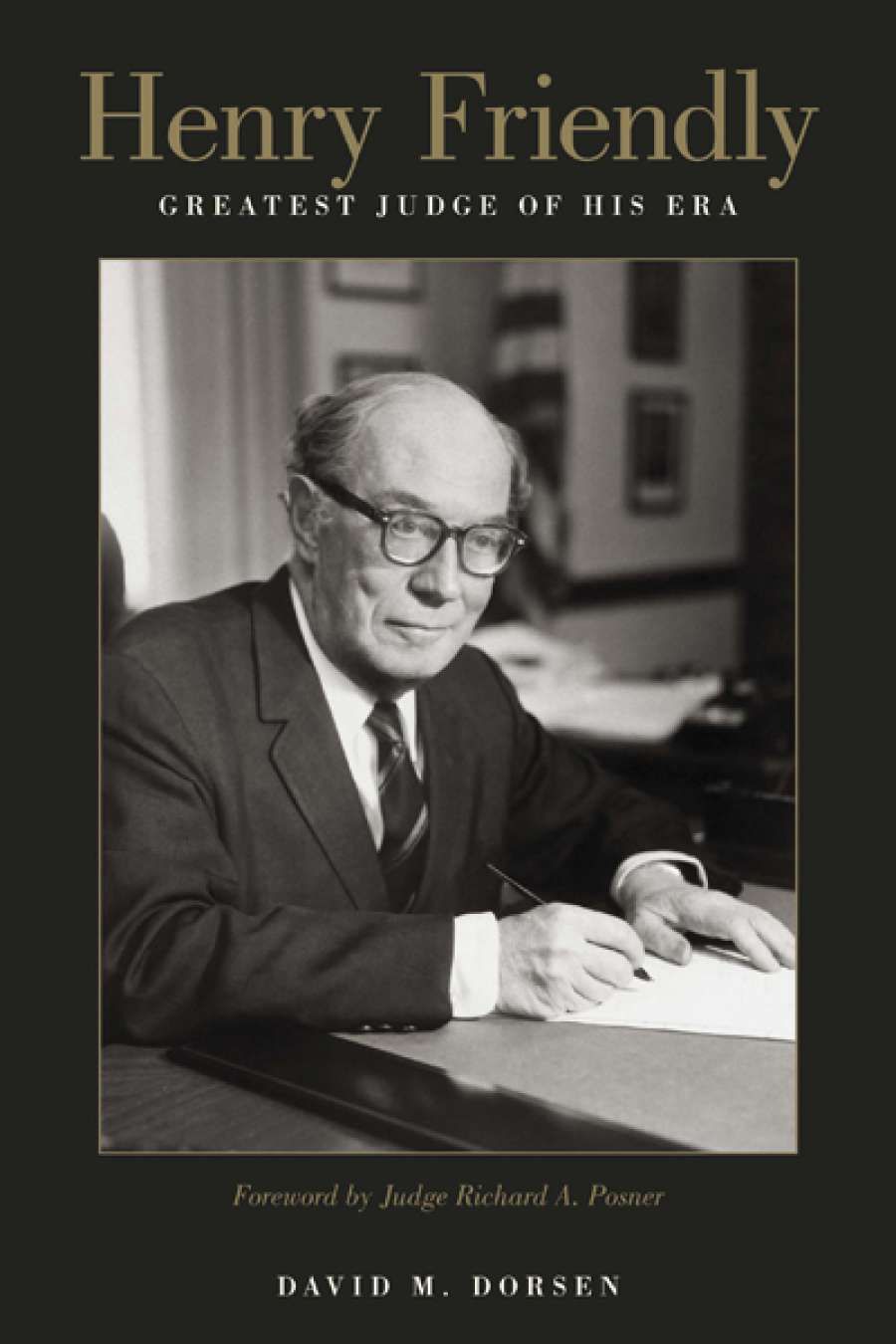
- Free Article: No
- Contents Category: Biography
- Review Article: Yes
- Online Only: No
- Custom Highlight Text:
Henry Friendly was a judge of the highest reputation – greater than Learned Hand in Justice Scalia’s opinion. His output was prodigious, his legacy unmatched: of his fifty-one clerks, twenty-one (including the present incumbent) became justices of the Supreme Court of the United States; in that Court’s decisions, only Learned Hand was cited more often than Friendly.
- Book 1 Title: Henry Friendly
- Book 1 Subtitle: Greatest judge of his era
- Book 1 Biblio: Harvard University Press (Inbooks), $49.95 hb, 512 pp
Friendly came from a German-Jewish family in New York State. He entered Harvard as a teenager, and distinguished himself in history, but was steered to law partly by family pressure. Felix Frankfurter recommended him to Justice Brandeis as a clerk. He practised law in New York from 1927 to 1959. His clients included Pan American, of which he was vice-president for thirteen years, until his time on the Second Circuit Court of the United States. He died, by his own hand, in 1986, aged eighty-two.
His pre-judicial career was at the centre of business activity: much of his work related to the New Deal. His expertise in transportation law gave him a lifelong distaste for non-judicial tribunals. His practice dealt with the vexed relations between capitalism and regulation. Dorsen’s account of the mingled transparency and devious partisanship in the machinations underlying his appointment is gripping and repellent in turn. Of Friendly’s failure to reach the Supreme Court, Dorsen writes:
Another problem confronting Friendly was his religion. In recorded conversations Nixon said that he had no interest in perpetuating a ‘Jewish seat’ on the High Court and that he did not want anyone to give him a ‘Jew’s name’, adding, ‘I don’t want a liberal Jew on the Supreme Court.’
Friendly’s extra-curial writings were influential, no less so than his judicial opinions. In his voting memoranda, Friendly offered brutal assessments of counsel, fellow judges, and litigants alike: ‘If the John Birch Society conducts all its affairs as incompetently as these lawsuits, the republic hasn’t much to fear.’ Nevertheless, while Friendly’s comments on specific cases could be apoplectic, his views designed to have general application were, as a rule, balanced, sound, and temperate.
Dorsen’s account of Friendly’s somewhat difficult and impenetrable personal characteristics is fair: mere personal inclination is not invoked to explain everything. Justice is done to his complex personality – Richard Posner, in his introduction, identifies five different Henry Friendlys. The account of Friendly’s death, in particular, is marked by great tact and dignity: the absence of vulgarity in this biography is welcome and exemplary.
Dorsen’s first eight chapters narrate Friendly’s pre-judicial career. Then thirteen chapters are devoted to specific themes in his judgments. These fine analyses deal with complex and technical matters, and will be of profound interest to lawyer and layman alike. They include many of the most vexing problems in the life of the Republic. For example, Friendly presided over the suit dealing with the Pentagon Papers, in 1971. He was infuriated by one witness who refused to concede what was obvious to all: that the New York Times well knew that the papers given to it had been stolen. Friendly, with savage irony, asked the witness if he would be happy if ‘[we] say they received the goods in the process of embezzlement?’
Friendly was in dissent, and sent a detailed memorandum of his strong views to one of the justices of the Supreme Court, who heard the ensuing appeal. This episode of rule-bending was not unique: Friendly was given to telephoning his old academic acquaintances for advice. When one of his clerks queried whether this was quite proper, ‘Friendly replied succinctly, “I do it”.’ He liked to outspeed his colleagues: ‘Friendly liked to get his voting memoranda out first to influence the vote of other members of the bench; he told a clerk that he didn’t want his fellow judges to think something stupid.’
The range of judgments considered by Dorsen is very large, and it is difficult to distil general principles from it. One example is the application of exclusionary principles, such as that found in the famous Miranda ruling. He gave the general public good more weight than is now the practice. In the case of terrorism, he said this about the application of the due-process clause:
When the risk is the jeopardy to hundreds of human lives and millions of dollars of property inherent in the pirating or blowing up of a large airplane, the danger alone meets the test of reasonableness, so long as the search is conducted in good faith for the purpose of preventing hijacking or like damage …
He asks cui bono: who benefits? That practical (and humane) approach must stand against the rigorous intellectual honesty with which Friendly applied legal principle to given facts.
As Posner remarks, this is a consummate biography, marked by fairness, balance, penetration, and legal scholarship. It deals with perennial problems which are not restricted to the US constitution, although our own constitutional jurisprudence has taken very different paths in dealing with cognate Australian provisions, such as the prohibition of an established religion.
Dorsen has provided a scholarly, readable analysis of the workings and philosophy of the US courts, and the conclusions of one of their greatest members. A more engrossing introduction to the public and hidden workings of these courts, and many great issues in the history of the United States, is hard to imagine.


Comments powered by CComment